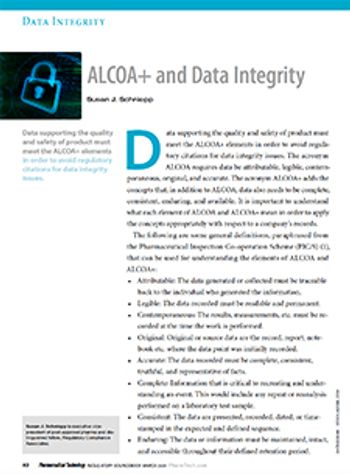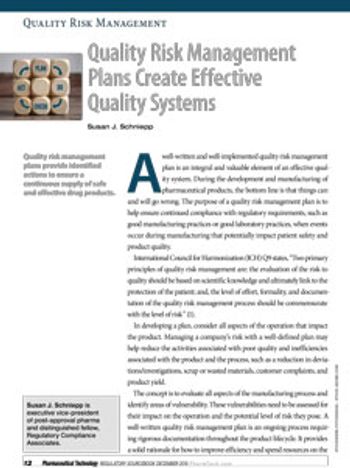
Susan J. Schniepp, distinguished fellow at Regulatory Compliance Associates, details regulatory requirements for developing a quality manual.

Susan J. Schniepp is a fellow at Regulatory Compliance Associates, Inc. and a member of Pharmaceutical Technology's Editorial Advisory Board.

Susan J. Schniepp, distinguished fellow at Regulatory Compliance Associates, details regulatory requirements for developing a quality manual.

Susan J. Schniepp, distinguished fellow at Regulatory Compliance Associates, answers some commonly asked questions about the difference between the roles of quality assurance and quality control.

Susan J. Schniepp, distinguished fellow at Regulatory Compliance Associates, answers some commonly asked questions about aseptic processing.

Experts Susan J. Schniepp, distinguished fellow for Regulatory Compliance Associates, and Steven J. Lynn, executive vice-president, Pharmaceuticals for Regulatory Compliance Associates, provide answers to frequently asked regulatory questions about advanced therapy medicinal products.

Susan J. Schniepp, distinguished fellow at Regulatory Compliance Associates, answers some commonly asked questions about regulatory filings.

Experts Steven J. Lynn, executive vice-president, Pharmaceuticals for Regulatory Compliance Associates, Inc., and Susan J. Schniepp, distinguished fellow for Regulatory Compliance Associates, Inc., provide simple answers to frequently asked questions regarding deviation investigations.

Experts Steven J. Lynn, executive vice-president, Pharmaceuticals for Regulatory Compliance Associates, Inc., and Susan J. Schniepp, distinguished fellow for Regulatory Compliance Associates, Inc., provide simple answers to frequently asked questions regarding regulatory inspections, although many of the concepts can be applied to internal and supplier audits as well.

With appropriate planning and the proper use of technology, remote auditing can be as effective and informative as in-person auditing.

Virtual audits, virtual training, and more robust quality agreements may become positive impacts on the industry, says Susan J. Schniepp, distinguished fellow at Regulatory Compliance Associates.

The amount of detail included in SOPs may help a company stay compliant, says Susan J. Schniepp, Distinguished Fellow at Regulatory Compliance Associates, LLC.

When in-person training may not be feasible, there are still opportunities to ensure employees receive the required training, says Susan J. Schniepp, distinguished fellow, Regulatory Compliance Associates.

Products must be manufactured in accordance with appropriate regulatory requirements, even during a pandemic, says Susan J. Schniepp, executive vice-president of post-approval pharma and distinguished fellow, Regulatory Compliance Associates.

Addressing data integrity, quality culture, aging facilities, investigations/corrective actions and preventive actions, and risk management is key when conducting audits, says Susan J. Schniepp, executive vice-president of post-approval pharma and distinguished fellow, Regulatory Compliance Associates.

Data supporting the quality and safety of product must meet the ALCOA+ elements in order to avoid regulatory citations for data integrity issues.

ICH will be taking industry comments under consideration when it revises its Q9 guideline in order to clarify QRM requirements, says Susan J. Schniepp, executive vice-president of post-approval pharma and distinguished fellow, Regulatory Compliance Associates.

Quality risk management plans provide identified actions to ensure a continuous supply of safe and effective drug products

Investigating deviations of combination products needs to accommodate both the drug and device components, says Susan J. Schniepp, executive vice-president of post-approval pharma and distinguished fellow, Regulatory Compliance Associates.

Data supporting the quality and safety of product must meet the ALCOA+ elements in order to avoid regulatory citations for data integrity issues, says Susan J. Schniepp, executive vice-president of post-approval pharma and distinguished fellow, Regulatory Compliance Associates.

Quality risk management plans provide identified actions to ensure a continuous supply of safe and effective drug products, says Susan J. Schniepp, executive vice-president of post-approval pharma and distinguished fellow, Regulatory Compliance Associates.

A good working relationship between sponsor and contractor will become invaluable when an OOS occurs, says Susan J. Schniepp, executive vice-president of post-approval pharma and distinguished fellow, Regulatory Compliance Associates.

A robust customer complaint handling system is an integral part of a quality management system, says Susan Schniepp, executive vice-president of post-approval pharma and distinguished fellow, Regulatory Compliance Associates.

Getting to the root of the cause can prevent future problems, says Susan Schniepp, executive vice-president of post-approval pharma and distinguished fellow, Regulatory Compliance Associates.

A required time frame should not be the driving force behind root cause investigations, says Susan Schniepp, executive vice-president of Post-Approval Pharma and Distinguished Fellow, Regulatory Compliance Associates.

Susan Schniepp, executive vice-president of Post-Approval Pharma and Distinguished Fellow, Regulatory Compliance Associates, takes a look at the regulations around data integrity and how they relate to the concept of quality culture.

The type of product, the packaging materials being used, and the process and materials used to manufacture the product will determine when E&L data should be submitted to regulators, says Susan J. Schniepp, executive vice-president, Post-approval Pharmaceuticals and distinguished fellow at Regulatory Compliance Associates.

Open communication channels between all the parties involved is key when outsourcing analytical methods, says Susan Schniepp, distinguished fellow at Regulatory Compliance Associates.

Certificates of analysis can be used to monitor the reliability of products and their suppliers, says Susan Schniepp, distinguished fellow at Regulatory Compliance Associates.

Regardless of the phase of development and the level of GMPs being applied, there should be adequate controls and knowledge to assure patient safety, according to Susan Schniepp, fellow at Regulatory Compliance Associates.

SOPs need to reflect a company’s specific manufacturing or other operations, says Susan Schniepp, distinguished fellow at Regulatory Compliance Associates.

Focusing on whether the product meets its defined quality attributes should help one make reasonable, documentable, and defendable risk-based decisions, according to Susan Schniepp, distinguished fellow at Regulatory Compliance Associates.